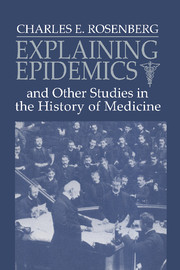Book contents
- Frontmatter
- Contents
- Acknowledgments
- Introduction: Why care about the history of medicine?
- I Ideas as actors
- II Institutions and medical care
- III The past in the present: Using medical history
- 11 The crisis in psychiatric legitimacy: Reflections on psychiatry, medicine, and public policy
- 12 Disease and social order in America: Perceptions and expectations
- 13 What is an epidemic? AIDS in historical perspective
- 14 Explaining epidemics
- 15 Framing disease: Illness, society, and history
- 16 Looking backward, thinking forward: The roots of hospital crisis
- Index
16 - Looking backward, thinking forward: The roots of hospital crisis
Published online by Cambridge University Press: 29 March 2010
- Frontmatter
- Contents
- Acknowledgments
- Introduction: Why care about the history of medicine?
- I Ideas as actors
- II Institutions and medical care
- III The past in the present: Using medical history
- 11 The crisis in psychiatric legitimacy: Reflections on psychiatry, medicine, and public policy
- 12 Disease and social order in America: Perceptions and expectations
- 13 What is an epidemic? AIDS in historical perspective
- 14 Explaining epidemics
- 15 Framing disease: Illness, society, and history
- 16 Looking backward, thinking forward: The roots of hospital crisis
- Index
Summary
In the 1980s, the words hospital and crisis seemed almost inseparable. Growing economic pressures in the health care system made an enormous variety of Americans sensitive to the medical problems of the here and now – and anxious about prospects for the future. This chapter was originally written for a symposium on the future of the American hospital, designed to illuminate the options facing America's health care professionals, planners, and consumers. As an historian among a varied assortment of academic physicians and social scientists assembled for the occasion, I sought to make a case for continuity – and by implication, the relevance of history in understanding the present and preparing for the future.
There is a problem, of course. By emphasizing the historical roots of contemporary problems one inevitably runs the danger of fatalism; choice seems increasingly limited by past constraints and expectations. But change is inevitable – in part because of the particular shape of underlying constraints and expectations – and an understanding of such deep-seated structuring factors is a precondition to the reasoned consideration of present choices. Most important, I sought to emphasize two sets of factors that seemed to me insufficiently articulated in many contemporary discussions of health care policy. One is the power of social attitudes – especially in relation to health, welfare, and science. A second is the way in which the hospital's history reflected the medical profession's particular history.
- Type
- Chapter
- Information
- Explaining Epidemics , pp. 319 - 341Publisher: Cambridge University PressPrint publication year: 1992



